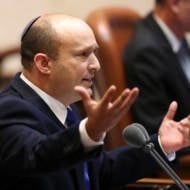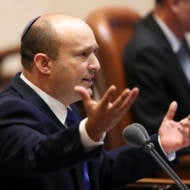Your cart is currently empty!

Israel’s Robust Democracy On Display in Raucous Parliamentary Session

Israel’s Robust Democracy On Display in Raucous Parliamentary Session

When the Knesset met on Sunday ahead of its vote on Israel’s new government, the Jewish state’s robust democracy was on full display.
By United with Israel Staff and AP
Israel’s designated prime minister, Naftali Bennett, addressed the parliament on Sunday, preparing to take the reins from Benjamin Netanyahu, who served in the post for 12 years.
In his speech to parliament, Bennett said that Israel remains ready to act against Iran. “Israel will not allow Iran to arm itself with nuclear weapons,” Bennett said. He added that “Israel will not be a party to the agreement and will continue to preserve full freedom of action.”
Bennett’s new government is scheduled to be sworn into office late Sunday after a parliamentary vote.
Commentators predict that Bennet’s disparate coalition of parties from the political right, left and center, in addition to an Islamist Arab party called Ra’am, will struggle to stay together.
The eight parties are likely to pursue a modest agenda that seeks to reduce tensions with the Palestinians and maintain good relations with the U.S. without launching any major initiatives.
Netanyahu remains the head of the largest party in parliament and is expected to vigorously oppose the new government. If just one faction bolts, it could lose its majority and would be at risk of collapse, giving him an opening to return to power.
As Bennett addressed parliament ahead of the vote on Sunday, lawmakers interjected repeatedly and vociferously, putting Israel’s robust democratic process on display.
Bennett thanked President Joe Biden and the U.S. for its decades of support for Israel.
Netanyahu, speaking after him, vowed to return to power. He predicted the incoming government would be weak on Iran and give in to U.S. demands to make concessions to the Palestinians.
“If it is destined for us to be in the opposition, we will do it with our backs straight until we topple this dangerous government and return to lead the country in our way,” he said.
Yair Lapid, a center-left former television personality, will become prime minister in two years, if the government lasts that long.
Netanyahu’s place in Israeli history is secure, having served as prime minister for a total of 15 years — more than any other, including the country’s founder, David Ben-Gurion.
Netanyahu stood up to the Obama administration, refusing to freeze construction of Jewish communities in Judea and Samaria.
Relations with Israel’s closest ally grew even rockier when Netanyahu vigorously campaigned against President Barack Obama’s emerging nuclear deal with Iran, even denouncing it in an address to the U.S. Congress.
Under the Trump administration, the U.S. recognized that Jerusalem is Israel’s capital, helped broker normalization agreements with four Arab states and withdrew from the from the disastrous Iran deal.
Netanyahu has also cultivated ties with Arab and African countries that long shunned Israel due to their alliance to the Palestinians.
JOIN ISRAEL’S MASSIVE SPRING PLANTING OF FRUIT TREES!
SPRING IS THE BEST TIME TO PLANT YOUR FRUIT TREES!
Make the Land of Israel even more beautiful and fruitful while helping Israeli farmers to recover from financial losses due to COVID-19 and devastating Hamas arson fires.
“…for the Lord your God is bringing you into a good land… a land of wheat and barley, vines, figs and pomegranates, a land of olive oil and honey”
(Deuteronomy 8:7-8)
CLICK TO PLANT YOUR FRUIT TREES IN ISRAEL TODAY!
The post Israel’s Robust Democracy On Display in Raucous Parliamentary Session first appeared on United with Israel.
United with Israel
